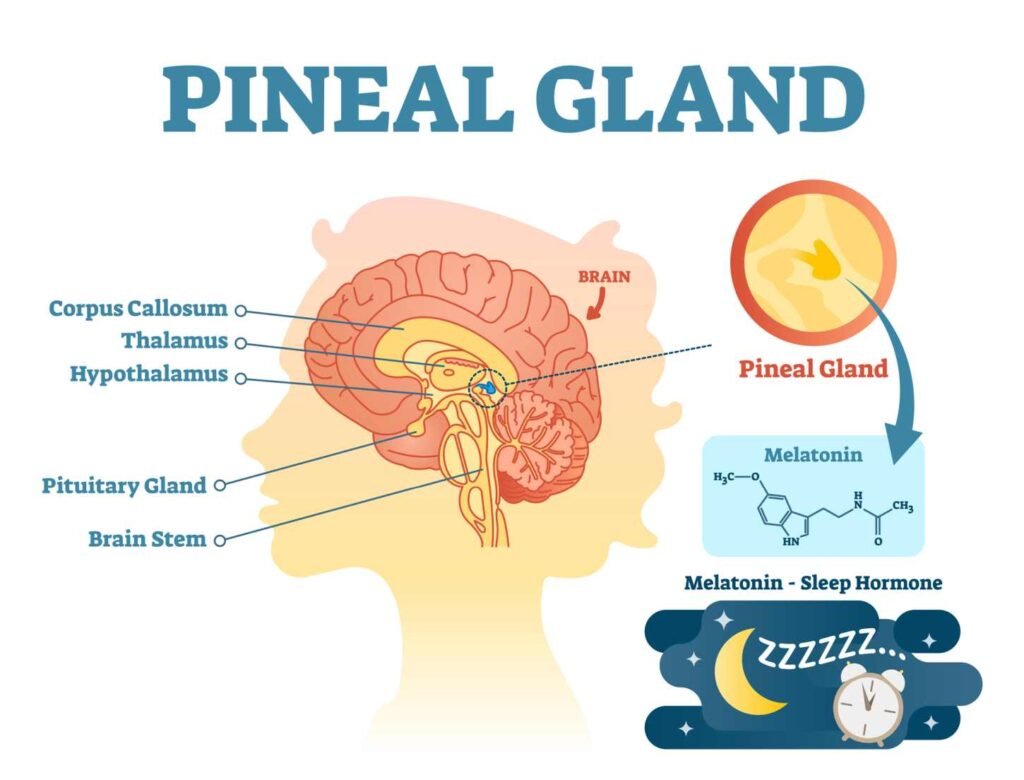Melatonin is a hormone that is naturally produced by the body’s pineal gland.
Melatonin plays a crucial role in regulating the sleep-wake cycle, also known as the circadian rhythm. Melatonin levels in the body typically rise in the evening, signaling to the brain that it is time to sleep. Conversely, levels decrease in the morning, signaling that it is time to wake up.
Research has shown that melatonin can be an effective treatment for sleep disorders such as insomnia and jet lag. It is available in supplement form, and many people use it to help regulate their sleep patterns. However, it is important to note that melatonin supplements can have side effects, and should only be taken under the guidance of a healthcare professional.
While melatonin is primarily known for its role in regulating the sleep-wake cycle, it also has other functions in the body. It has been found to have antioxidant properties, and may play a role in regulating the immune system. Ongoing research is exploring the potential benefits of melatonin in treating a variety of health conditions.

Understanding Melatonin
Biological Role
Melatonin is a hormone that is naturally produced by the pineal gland in the brain. It plays a crucial role in regulating the body’s circadian rhythm, which is the natural 24-hour cycle that controls sleep and wakefulness. Melatonin is also involved in regulating other physiological processes, including body temperature, blood pressure, and immune function.
Production and Regulation
The production of melatonin is regulated by the body’s internal clock. When it gets dark outside, the pineal gland begins to produce melatonin, which signals to the body that it is time to sleep. Conversely, when it gets light outside, melatonin production decreases, which signals to the body that it is time to wake up.
Melatonin production is also influenced by age. As people get older, their bodies produce less melatonin, which can contribute to sleep problems. Additionally, certain medications and lifestyle factors, such as exposure to bright lights at night, can disrupt melatonin production and interfere with sleep.
Overall, understanding the biological role and production of melatonin is crucial for maintaining a healthy sleep-wake cycle and overall health.
Melatonin Supplements
Types and Forms
Melatonin supplements are available in various forms, including capsules, tablets, gummies, and liquids. Some melatonin supplements are designed to release the hormone slowly over several hours, while others are intended for immediate release.
Melatonin supplements can be made from synthetic or natural sources. Natural melatonin supplements are derived from the pineal gland of animals, such as cows or sheep, while synthetic melatonin supplements are made in a laboratory.
Usage Guidelines
Melatonin supplements are commonly used to help regulate sleep patterns and treat sleep disorders, such as insomnia. The appropriate dosage of melatonin supplements can vary depending on the individual and the reason for use.
It is recommended to start with a low dose of melatonin supplements, typically 0.5 to 1 milligram, and gradually increase the dosage as needed. It is important to take melatonin supplements at the same time each day, preferably before bedtime.
Melatonin supplements should not be used by pregnant or breastfeeding women, children, or individuals with certain medical conditions, such as liver disease. It is also important to avoid driving or operating heavy machinery after taking melatonin supplements, as they can cause dizziness and drowsiness.
Safety and Side Effects
Melatonin supplements are generally considered safe when used as directed. However, some individuals may experience side effects, such as headache, dizziness, and nausea.
Long-term use of melatonin supplements may also have potential risks, including decreased sperm count in men and disrupted menstrual cycles in women. It is important to talk to a healthcare provider before using melatonin supplements, especially if you have a medical condition or are taking medication.
Melatonin supplements are available over-the-counter as a dietary supplement in most countries. In some countries, such as the United States, melatonin supplements are also available by prescription.
Overall, melatonin supplements can be a useful tool for regulating sleep patterns and treating sleep disorders. However, it is important to use them responsibly and under the guidance of a healthcare provider.
Health Benefits and Uses
Sleep Disorders
Melatonin is commonly used as a natural remedy for sleep disorders, such as insomnia. It is a hormone that helps regulate the sleep-wake cycle and promote sleep. Melatonin supplements can help improve sleep quality and increase total sleep time in people with sleep disorders.
Jet Lag and Shift Work
Melatonin can also be used to alleviate symptoms of jet lag and shift work sleep disorder. When traveling across time zones or working night shifts, the body’s natural sleep-wake cycle can be disrupted. Taking melatonin supplements can help reset the body’s internal clock and improve sleep quality.
Mood and Mental Health
Melatonin may also have benefits for mood and mental health. It has been shown to have a calming effect on the mind and body, which can help reduce symptoms of anxiety and depression. Melatonin supplements may also be helpful for people with autism spectrum disorder and ADHD, who often have difficulty falling asleep and maintaining a regular sleep schedule.
Overall, melatonin is a natural and effective way to improve sleep quality and regulate the sleep-wake cycle. It can also have benefits for mood and mental health. However, it is important to speak with a healthcare provider before starting any new supplement regimen.
Melatonin in Special Populations
Children and Adolescents
Melatonin is sometimes used as a sleep aid for children and adolescents with sleep problems. However, the American Academy of Pediatrics does not recommend the use of melatonin in healthy children or adolescents, as there is insufficient evidence regarding its safety and effectiveness in this population. In addition, it is important for healthcare providers to carefully evaluate any underlying medical or behavioral issues that may be contributing to sleep problems in children and adolescents before considering the use of melatonin.
Older Adults
As people age, their bodies may produce less melatonin, leading to sleep problems. Some older adults may choose to take melatonin supplements to help improve their sleep. However, it is important for healthcare providers to carefully evaluate any underlying medical conditions or medications that may be contributing to sleep problems in older adults before recommending melatonin. In addition, older adults should be cautious when taking melatonin, as it may interact with certain medications and may increase the risk of falls.
Pregnancy Considerations
There is limited research on the safety of using melatonin during pregnancy. Therefore, pregnant women should talk to their healthcare provider before taking melatonin supplements. In addition, women who are breastfeeding should also talk to their healthcare provider before taking melatonin, as it is not clear whether melatonin is safe for infants.
Overall, while melatonin may be helpful for some individuals with sleep problems, it is important for healthcare providers to carefully evaluate each individual’s unique situation before recommending melatonin. Additionally, individuals should always talk to their healthcare provider before starting any new supplements or medications.
Interactions and Contraindications
Medication Interactions
Melatonin may interact with certain medications, including blood pressure medications, immunosuppressants, anticonvulsants, and diabetes medications. It is important to speak with a healthcare provider before taking melatonin if you are on any of these medications.
Fluvoxamine, a medication used to treat obsessive-compulsive disorder and depression, may increase the effects of melatonin. This can lead to excessive sleepiness and dizziness. Therefore, it is important to avoid taking melatonin with fluvoxamine.
Health Conditions
Melatonin may also interact with certain health conditions. Individuals who are taking blood thinners, such as warfarin, should speak with their healthcare provider before taking melatonin. Melatonin may increase the risk of bleeding in these individuals.
Contraceptive drugs may also interact with melatonin. Melatonin may decrease the effectiveness of contraceptive drugs, leading to unintended pregnancies. Therefore, it is important to speak with a healthcare provider before taking melatonin if you are on contraceptive drugs.
Melatonin is metabolized by cytochrome P450 1A2 and 2C19 enzymes. Therefore, individuals who are taking medications that affect these enzymes, such as seizure threshold lowering drugs, should speak with their healthcare provider before taking melatonin.
It is important to note that melatonin may lower the seizure threshold in individuals with epilepsy. Therefore, individuals with epilepsy should speak with their healthcare provider before taking melatonin.
Overall, it is important to speak with a healthcare provider before taking melatonin if you are on any medications or have any health conditions.
Frequently Asked Questions
What are the potential side effects of taking melatonin supplements?
Melatonin supplements are generally considered safe when used as directed. However, some users may experience mild side effects such as dizziness, headache, nausea, and drowsiness. It is important to note that melatonin supplements may interact with certain medications, so it is recommended to consult with a healthcare provider before taking them.
How does melatonin impact overall health and bodily functions?
Melatonin is a hormone that is naturally produced by the body and plays a crucial role in regulating sleep-wake cycles. In addition to its role in sleep regulation, melatonin has been studied for its potential benefits in reducing anxiety, improving mood, and boosting the immune system. However, more research is needed to fully understand the impact of melatonin on overall health and bodily functions.
Can melatonin be used on a daily basis for sleep regulation without risks?
Melatonin can be used on a daily basis for sleep regulation, but it is important to follow the recommended dosage and to consult with a healthcare provider before starting a regular regimen. Long-term use of melatonin supplements has not been extensively studied, so it is unclear if there are any risks associated with daily use.
What is the recommended dosage for melatonin when used as a sleep aid?
The recommended dosage for melatonin supplements varies depending on the individual and the specific product. Generally, a dose of 1-5 milligrams taken 30-60 minutes before bedtime is recommended for adults. It is important to follow the instructions on the product label and to consult with a healthcare provider before taking melatonin supplements.
How do melatonin supplements compare with natural melatonin produced by the body?
Melatonin supplements are designed to mimic the effects of natural melatonin produced by the body. However, the quality and effectiveness of melatonin supplements can vary depending on the brand and formulation. Additionally, some studies suggest that natural melatonin may be more effective in regulating sleep-wake cycles than supplements.
What should one consider before starting a melatonin supplement regimen?
Before starting a melatonin supplement regimen, it is important to consider any potential interactions with other medications or health conditions. It is also important to follow the recommended dosage and to consult with a healthcare provider before starting a regular regimen. Finally, it is important to note that melatonin supplements should not be used as a substitute for good sleep hygiene practices, such as maintaining a regular sleep schedule and avoiding caffeine and alcohol before bedtime.
Jet Lag Disorder: Causes, Symptoms, and Treatment

Jet lag disorder is a common condition that affects individuals who travel across multiple time zones. The human body has an internal clock, also known as the circadian rhythm, which regulates various physiological processes such as sleep-wake cycles, hormone secretion, and body temperature.
Continue reading about: Jet Lag Disorder
Shift Work Sleep Disorder: Causes, Symptoms, and Treatment

Shift Work Sleep Disorder is a sleep disorder that affects people who work non-traditional hours or rotating shifts. It is characterized by a disruption of the normal sleep-wake cycle, resulting in excessive sleepiness during work hours and difficulty sleeping during non-work hours. It is a common problem for shift workers, with an estimated prevalence of up to 25% among those who work non-traditional hours.
Continue reading about: Shift Work Sleep Disorder





